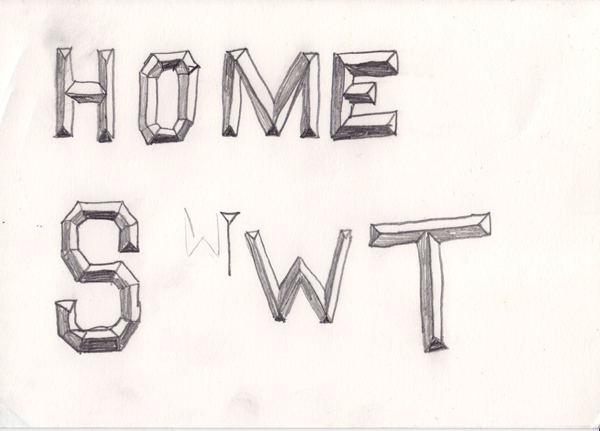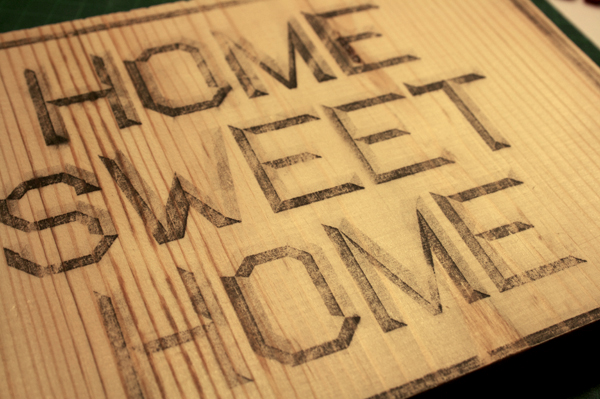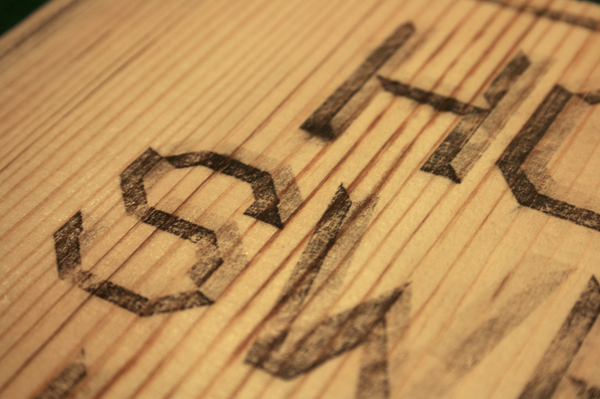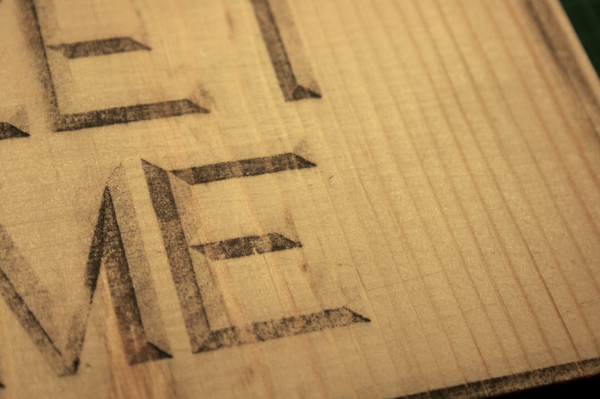I'm in love with this set of photos 'Le Camp' by Claudine Doury. They beautifully capture a period between childhood and adulthood- documenting a space away from the domesticity of the home and the imposing structures which parents put in place. 
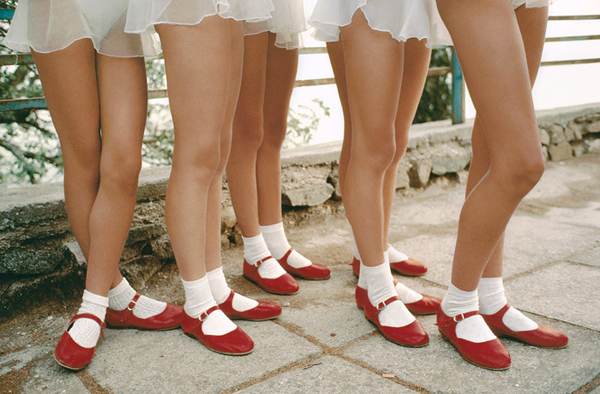 Link here: Claudine Doury
Originally found here: also nice- iconology
Link here: Claudine Doury
Originally found here: also nice- iconology
Yesterdays post- Today!
Behind the Scenes at the Museum
 This is a fantastic set of documentaries by Richard Macer which looks at three ailing British Museums: The National Waterways Museum, The Freud Museum and the Commercial Vehicles Museum, under the pretense of looking at why they are failing and how they are trying to reconnect with the visiting public.
This is a fantastic set of documentaries by Richard Macer which looks at three ailing British Museums: The National Waterways Museum, The Freud Museum and the Commercial Vehicles Museum, under the pretense of looking at why they are failing and how they are trying to reconnect with the visiting public.
I firstly love this set of programmes because I love museums- I've got a real thing for them. I love the processes of collecting, accumulating, storage and display (as friends know only too well). I love the feel of them- the museums documented here are the sort of museum my childhood was filled with- wooden cases with curios and engines and stuff and I personally think there's little more British than Leyland Lorries and Canal Boats. There's a warmth and bored interest surrounding very specific information conveyed through plauqes and 'Authentic' surroundings.
So there were a few interesting bits and pieces about how the Museums faced a challenge in attracting new visitors without compromising the context and history of the space which the Museums inhabit- which are often the now disused housings of the exhibits at the museums- Boat sheds for the waterways, transport warehouses for the buses and lorrries, old mills for the Victorian industrial revolution that sort of thing. One poignant point from the now ex Director of the Waterways museum was that a few years ago visitors were visiting these places as there was a nostalgia for them. These visitors had canal boats and stuff when they were kids and so there was an interest in getting back to that. Now, however there was no such nostalgia. The canal boats were now an anachronism, and the museum's challenge was in making these almost alien artifacts relevant to an audience who felt no real affinity towards them.
All the documentaries though, happily veered off towards the people who were within the museums- those working and volunteering to keep the place running, and the relationships and politics between them. Whilst there were some traditonalists who were stuck in the 'olden days' the most interesting thing for me was seeing the passion and enthusiasm which the volunteers put into their respective tasks and the camaraderie they found through it. The Commercial Vehicles Museum had a particularly endearing character called Errol (pictured) who had been an employee at Leyland and now worked in the cafe at the museum- he heated up mushroom soup, morrisons beans, and buttered baps for ham sandwhichs. He was so happy- and the friendship between these, almost exclusively, old men was quite touching to watch.
I'm sure to most it sounds like a rubbish watch but I think it's an important, interesting bit of social, anthropological history which most people will be able to relate to. Check them out here until 3rd June: BBC Behind the Scenes at the Museum
Typewriter Typeface
Processing Mk.2
 Not so good today. Managed to get this box to move across a screen (with random colours for prettyness), but that was about it. I managed to remake what I did yesterday but with objects instead of whatever normal code is which I guess is an achievement and I'm starting to recognise what I don't know- Arrays are doing my head. So is the for(i++) type of function so those guys are next on the list.
Not so good today. Managed to get this box to move across a screen (with random colours for prettyness), but that was about it. I managed to remake what I did yesterday but with objects instead of whatever normal code is which I guess is an achievement and I'm starting to recognise what I don't know- Arrays are doing my head. So is the for(i++) type of function so those guys are next on the list.
Processing
 I've committed myself to learning processing this week and, after a 9–5 day at home, I've got the hang of the basics again. Drawing shapes, points, lines, colouring them with transparencies, random positioning and colour, mouse pressed commands, exporting, print lining, mouse following and general setup and syntax. Not bad but it really taxes my brain- I think it's going to be a bit of an effort for me- it doesn't come naturally but hopefully a week will see me a bit better at least- I'm going to push myself to produce at least a screenshot every day.
I've committed myself to learning processing this week and, after a 9–5 day at home, I've got the hang of the basics again. Drawing shapes, points, lines, colouring them with transparencies, random positioning and colour, mouse pressed commands, exporting, print lining, mouse following and general setup and syntax. Not bad but it really taxes my brain- I think it's going to be a bit of an effort for me- it doesn't come naturally but hopefully a week will see me a bit better at least- I'm going to push myself to produce at least a screenshot every day.
Requiem for Detroit
A fantastic BBC documentary about the post industrial shell that Detroit became it's past and future. It shows how, through the automotive industry and it's pioneering mass manufacturing processes, the city grew wildly and then fell in on itself creating desolate neighbourhoods and unsustainable social conditions. In showing Detroit as this micro world with it's creation of cars and the manufacturing of the 'American Dream' the creation of suburbs and societies split along economic and racial lines which then crumbles it acts as a metaphor for America and the world at large. It also shows how Detroit is coping with this post industrial world it created: as a return to farming and small scale community and cottage industries. As one lady put it- "you could see it as a portrait of a world gone wrong, or as a vision of the future." Really cool. Watch it here.
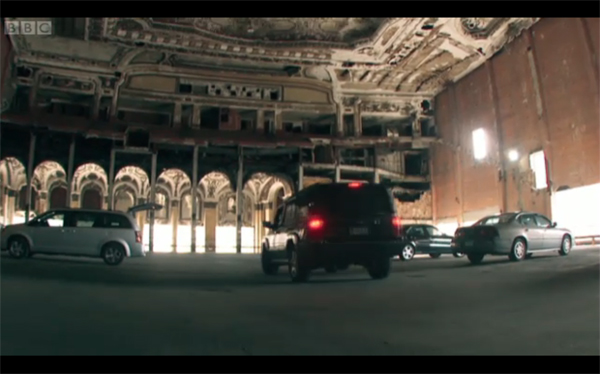
'The Michigan theatre to me is like the classic story of it all- I mean that's where Henry Ford built his first car, his wealth creates this building with this magnificent theatre, and then the theatre dies. Why? No parking. And then the building's gonna die so what do they do? They gut the theatre and make a parking lot out of it.'



